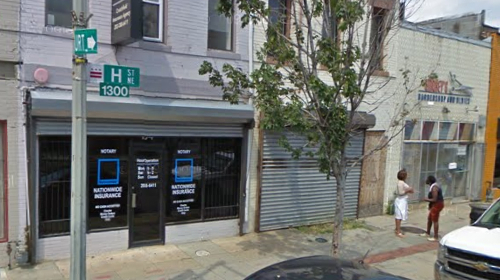The Cost of Anti-Chainism
To my eye, Washington DC looks like it has too few retail establishments. There are lots of vacant storefronts, and yet existing businesses rarely seem to fail. At the same time a freakishly large number of major national chains are unrepresented in our fair city.
(google street view)
Lydia DePillis visits the International Franchising Expo to explore the reasons why and naturally it's somewhat complicated. But at least part of the problem is that some of the most promising locations simply won't let new businesses open up:
With that understanding of D.C.'s geography, it's hard to even grasp the fact that the city is still drastically "under-retailed," as they say in government circles. We have 14 retail square feet per person, compared to the nationwide average of 23 square feet. But you wouldn't know that if you just stayed downtown, or near existing retail corridors like Wisconsin Avenue, Connecticut Avenue, U Street, or 14th Street—all in Northwest.
Of course, in many neighborhoods, a street full of chains isn't the ideal endpoint for a revitalized commercial strip. Healthy places attract and foster independent businesses that offer something different than malls across the country. Some areas, like H Street NE, have taken active steps to keep out fast food places that they fear would generate trash and tarnish the corridor's local character. And it's hard not to feel let down by the fact that Subway and Dunkin Donuts are opening in the marquee spot at 14th and U streets NW, blocks away from other locations.
I wish people would think harder about the costs of this sort of decision. I completely sympathize with the aesthetic point that one thing I like about living in a city is the existence of options that are different from strip mall homogeneity. But actually if you drive out to DC's suburbs you'll see that some of the most interesting retail in the area—including all the best independently owned Chinese and Vietnamese restaurants—is actually located in strip malls. So it's not obvious that whatever it is we're doing is succeeding all that well at creating anything other than empty spaces. At the same time, we have a lot of unemployment in this city, particularly among people with low educational attainment. And that's even though the high-end job market in the metro area is among the healthiest in the country. The approximately 20 percent of DC residents who don't have a high school degree simply aren't qualified for the kinds of office work that the area has in ample supply. But these people would be qualified to work in a KFC or a Wendy's or to drive a delivery truck or all the rest. The costs of restricting these kind of business opportunities aren't all borne by profiteering developers or landlords, the majority of economic activity goes to labor compensation so when you restrict the kind of economic activity that employs low-skill labor in a high-unemployment environment, you really hurt low-skill workers.


Matthew Yglesias's Blog
- Matthew Yglesias's profile
- 72 followers




